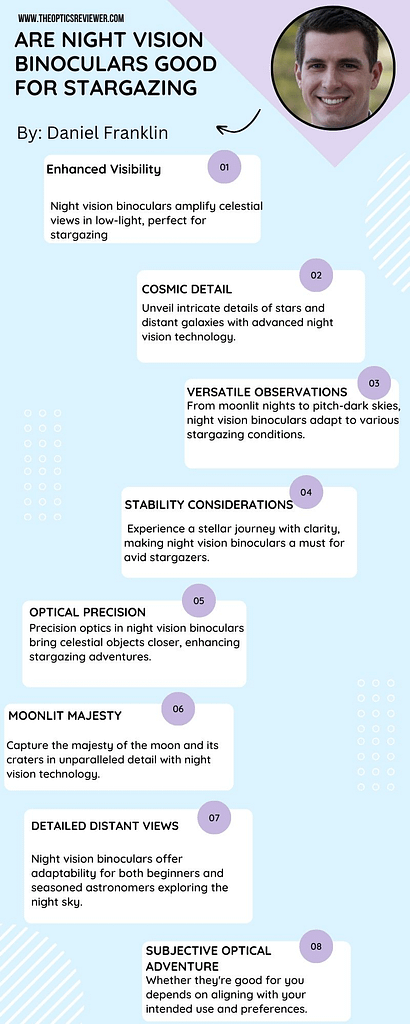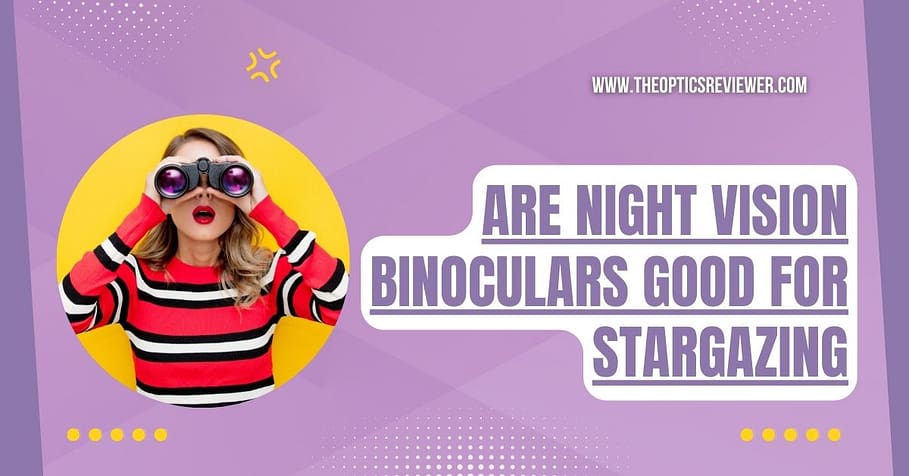Embarking on a celestial journey, the question arises: Are night vision binoculars Good for stargazing? Delving into the cosmos, these optical wonders promise to unveil the secrets of the night sky in unprecedented detail. Night vision binoculars, renowned for their prowess in low-light conditions, beckon astronomers and stargazers to explore the celestial tapestry with enhanced clarity.
In this cosmic odyssey, we’ll unravel the capabilities that make night vision binoculars a potential game-changer for those yearning to decipher the mysteries of distant galaxies. Join us as we navigate the realms of the cosmos and illuminate the possibilities that these advanced optical instruments bring to the awe-inspiring world of stargazing. Are night vision binoculars truly the key to unlocking the wonders of the night sky? Let’s embark on this celestial voyage to find out.
Contents
- 1 Key Takeaways
- 2 What Do You Mean By Night Vision Binoculars?
- 3 Are Night Vision Binoculars Good For Stargazing?
- 4 What are Some Popular Locations For Stargazing With Night Vision Binoculars?
- 5 What are Some Recommended Night Vision Binoculars For Stargazing?
- 6 What are the Features of Night Vision Binoculars For Stargazing ?
- 7 What is the Price Range For Night Vision Binoculars For Stargazing?
- 8 What are the Benefits of Using Night Vision Binoculars For Stargazing?
- 9 Conclusion
- 10 References
- 11 Frequently Asked Questions
- 11.1 Can Night Vision Binoculars Be Used for Stargazing in Light-Polluted Areas?
- 11.2 Are There Any Special Maintenance Requirements for Night Vision Binoculars Used for Stargazing?
- 11.3 Can Night Vision Binoculars Be Used to View Planets and Other Celestial Bodies in Addition to Stars?
- 11.4 Do Night Vision Binoculars Enhance the Colors of Stars and Galaxies When Stargazing?
- 11.5 Are There Any Specific Accessories or Attachments That Are Recommended for Night Vision Binoculars When Stargazing?
Key Takeaways
- Traditional binoculars often outperform night vision for stargazing.
- Night vision may lack color vividness crucial for celestial observation.
- Night vision may compromise sharpness and resolution needed for stargazing.
- High-resolution lenses and clarity are essential for observing celestial sights effectively.
What Do You Mean By Night Vision Binoculars?
Night vision binoculars are optical devices designed with specialized technology that amplifies ambient light to enhance visibility in low-light conditions, allowing users to observe objects in the dark with clarity and detail. These binoculars utilize image intensifier tubes to collect and amplify minimal light available in the environment, converting it into visible images. The technology behind night vision binoculars involves three key parts: an objective lens to gather light, an image intensifier tube to amplify the light, and an eyepiece to view the enhanced image.
The primary uses of night vision binoculars include surveillance, wildlife observation, navigation in low-light environments, and security operations. One of the significant advantages of these devices is their ability to provide clear visibility in situations where natural light is limited, offering improved situational awareness and safety. However, night vision binoculars have limitations such as reduced effectiveness in complete darkness, potential image distortion at longer distances, and high cost due to advanced technology and components.

Are Night Vision Binoculars Good For Stargazing?
Embarking on a journey to explore the cosmos, the question arises: Are night vision binoculars the ideal companions for the avid stargazer? As we peer into the night sky, the unique capabilities of night vision technology promise to enhance the stargazing experience in profound ways.
1. Unveiling the Night Sky: Night vision binoculars, equipped with advanced light-amplifying technology, offer a gateway to the celestial realms, revealing stars, planets, and distant galaxies with unparalleled clarity.
2. Low-Light Prowess: Stargazing often involves observing in low-light conditions. Night vision binoculars excel in capturing faint celestial objects, bringing forth a cosmic spectacle that might elude the naked eye.
3. Observing Details: Beyond the visible spectrum, night vision binoculars amplify celestial details, allowing enthusiasts to discern finer features of the moon, distant planets, and deep-sky objects.
4. Lunar Exploration: Night vision capabilities are particularly advantageous for lunar observations. Witness the craters and lunar landscapes in intricate detail as the moon comes to life through the lenses.
5. Deep-Sky Marvels: For those aiming to delve into deep-sky exploration, night vision binoculars can unveil nebulae, star clusters, and galaxies that might remain elusive with standard binoculars.
6. Ambient Light Preservation: Night vision technology minimizes reliance on external light sources, preserving the ambient darkness crucial for optimal stargazing conditions.

What are Some Popular Locations For Stargazing With Night Vision Binoculars?
Popular destinations for stargazing with night vision binoculars often include remote wilderness areas, national parks, and designated dark sky reserves known for their minimal light pollution levels. Some of the best locations for stargazing with night vision binoculars are Death Valley National Park in California, Cherry Springs State Park in Pennsylvania, and Mauna Kea in Hawaii. These sites offer ideal conditions for observing celestial sights due to their high elevation, clear skies, and limited artificial light interference.
Astronomy events such as meteor showers, planetary alignments, and eclipses can be spectacular when viewed through night vision binoculars in these dark sky locations. Stargazers can witness breathtaking views of distant galaxies, nebulae, and star clusters with optimal equipment that enhances visibility in low-light conditions. By choosing these prime stargazing spots and utilizing night vision binoculars, enthusiasts can immerse themselves in the wonders of the universe with enhanced clarity and detail.
What are Some Recommended Night Vision Binoculars For Stargazing?
Embarking on a cosmic journey requires the right optical companion, especially when venturing into the realms of stargazing. Night vision binoculars, with their ability to pierce through the darkness, open new horizons for enthusiasts eager to explore the celestial wonders. Here are some recommended night vision binoculars that elevate the stargazing experience:
1. Celestron EclipSmart 10×42:
- Renowned for its exceptional light-gathering capabilities, providing vivid views of stars and celestial bodies. Ideal for both novice and seasoned stargazers.
2. ATN BinoX 4K Smart Day/Night Binoculars:
- Blending advanced optics with digital features, these binoculars offer day and night vision functionality, making them versatile for various celestial observations.
3. Bushnell Equinox Z Digital Night Vision Binoculars:
- With powerful infrared illumination, these binoculars unveil the night sky’s beauty, offering clarity for moonlit nights and revealing distant constellations.
4. Night Owl Pro Nexgen Night Vision Binoculars:
- Boasting high-quality image intensifier tubes, these binoculars provide enhanced brightness and sharpness, perfect for capturing the intricate details of celestial objects.
5. Barska NVX300 Infrared Illuminator Binoculars:
- Equipped with infrared illumination, these binoculars excel in low-light conditions, making them a reliable choice for stargazing adventures.
6. Sightmark Ghost Hunter 2×24 Night Vision Binoculars:
- Compact and lightweight, these binoculars deliver impressive optical performance, making them an excellent companion for on-the-go stargazing.
What are the Features of Night Vision Binoculars For Stargazing ?
Night vision binoculars designed for stargazing typically feature high-resolution lenses, multi-coated optics, and a moderate to high magnification power to enhance celestial observations with clarity and detail. These stargazing essentials are crucial for exploring the night sky wonders and engaging in astronomical observation. The high-resolution lenses ensure that faint stars and distant celestial objects appear sharp and well-defined, providing an immersive experience for celestial exploration. Multi-coated optics help in reducing glare and reflections, allowing for a clearer view of the dark sky adventures.
Additionally, night vision binoculars for stargazing often come with adjustable diopters to accommodate individual eye differences, ensuring comfortable and focused viewing during prolonged stargazing sessions. Some advanced models may also include features like image stabilization technology for steady images, long eye relief for enhanced comfort, and waterproof or fog-proof construction for durability in various environmental conditions. These features collectively contribute to an optimal stargazing experience, enabling enthusiasts to delve deeper into the mysteries of the night sky.
If interested you can read more about when were binoculars invented.
What is the Price Range For Night Vision Binoculars For Stargazing?
Amidst the varied array of features and specifications offered by night vision binoculars tailored for stargazing enthusiasts, the price range for these specialized optical instruments typically reflects the quality of optics, magnification power, and additional functionalities incorporated into the design. When considering night vision binoculars for stargazing, here are some key points to keep in mind:
- Budget options: Entry-level night vision binoculars can be found in the range of $100 to $300, offering basic night vision capabilities suitable for beginners or occasional users.
- High end models: Premium night vision binoculars with advanced features such as high magnification, superior image clarity, and extensive range can range from $1000 to $5000, catering to professionals or serious enthusiasts.
- Affordable choices: There are mid-range night vision binoculars available in the $300 to $1000 range, striking a balance between quality and affordability for intermediate users.
- Pricing comparisons: It is essential to compare prices across different brands and models to ensure you are getting the best value for your investment.
If interested you can read more about can you bring binoculars to sofi stadium.
What are the Benefits of Using Night Vision Binoculars For Stargazing?
Considering the advanced optical capabilities and enhanced viewing experiences they provide, utilizing night vision binoculars for stargazing offers a multitude of benefits to enthusiasts of celestial observation. Night vision technology incorporated into these binoculars allows users to peer deep into the night sky, revealing faint stars, distant planets, and even celestial phenomena like nebulae with exceptional clarity. The binocular magnification further enhances the stargazing experience by bringing distant objects closer, making them appear larger and more detailed.
One significant advantage of using night vision binoculars for stargazing is the ability to observe celestial bodies in dark sky locations with minimal light pollution. This results in a clearer and more immersive viewing experience, allowing stargazers to appreciate the night sky in all its splendor. Additionally, the optical clarity provided by these binoculars ensures that users can distinguish fine details and intricate patterns in the night sky, enhancing their overall enjoyment and understanding of the cosmos. Overall, the benefits of using night vision binoculars for stargazing are undeniable, offering enthusiasts a unique and rewarding way to explore the wonders of the universe.
If interested you can read more about are 80 x 80 binoculars good.
Conclusion
In conclusion, Are Night Vision Binoculars Good For Stargazing? While night vision binoculars offer enticing possibilities for stargazing adventures, their effectiveness depends on various factors. These innovative optical devices can enhance your celestial observations, revealing the hidden wonders of the night sky with unparalleled clarity.
However, their performance may be influenced by ambient light conditions, magnification capabilities, and overall optical quality. By carefully considering your stargazing goals, budget, and the specific features of night vision binoculars, you can determine whether they are indeed a good fit for your astronomical pursuits. Explore the cosmos with curiosity and discernment, guided by the promise of stellar discoveries.
References
- https://link.springer.com/article/10.1007/BF00235723
- https://link.springer.com/article/10.1007/BF00233186
- https://link.springer.com/article/10.1007/BF00237700
- https://link.springer.com/article/10.1007/BF00248796
Frequently Asked Questions
Can Night Vision Binoculars Be Used for Stargazing in Light-Polluted Areas?
Night vision binoculars are not ideal for stargazing in light-polluted areas due to limitations in magnification and clarity. Star clusters may lack visibility, and observing nebulae could be challenging. Identifying constellations might also be difficult.
Are There Any Special Maintenance Requirements for Night Vision Binoculars Used for Stargazing?
When maintaining night vision binoculars for stargazing, remember key maintenance tips such as regular cleaning techniques to prevent lens damage, timely battery replacement for optimal performance, proper storage precautions to avoid moisture, and using lens protection to safeguard against scratches.
Can Night Vision Binoculars Be Used to View Planets and Other Celestial Bodies in Addition to Stars?
Night vision binoculars can enhance celestial viewing experiences by enabling clear observation of planets, star clusters, and nebulae. With their advanced technology, these binoculars provide detailed views for lunar observations and exploration of various celestial bodies.
Do Night Vision Binoculars Enhance the Colors of Stars and Galaxies When Stargazing?
Night vision binoculars provide enhanced visibility of celestial bodies by amplifying available light. They do not alter the natural colors of stars and galaxies, but can improve clarity for observing star clusters and planets. Proper accessories like stargazing filters and tripods enhance astronomy photography.
Are There Any Specific Accessories or Attachments That Are Recommended for Night Vision Binoculars When Stargazing?
Recommended filters, tripod compatibility, eyepiece adapters, lens cleaning, and protective cases are essential accessories for night vision binoculars when stargazing. Filters enhance clarity, tripods stabilize viewing, adapters improve comfort, cleaning maintains quality, and cases protect equipment.

